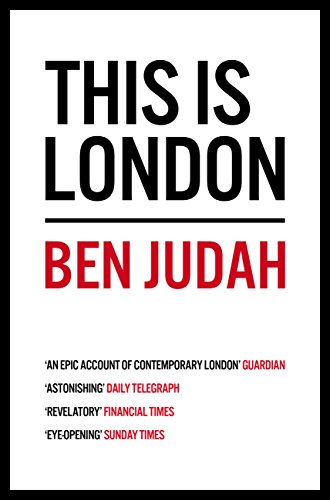This Is London
Life And Death In The World City
Ben Judah

Complex, bleak, thrilling. I think a lot depends on how you approach this, it could easily be read as the most bleak indictment of globalisation and multi-culturalism or you could choose to see it as an astonishing insight into the birth of a new world. Lots to think about and challenged many of my preconceptions and comfortably held opinions.
I don’t know if I love the new London or if it frightens me: a city where at least 55 per cent of people are not ethnically white British, nearly 40 per cent were born abroad, and 5 per cent are living illegally in the shadows. I have no idea who these new Londoners are. Or even what their London really is.
buildings sculpted with that lurid, time- melting imagination which gripped the English when they were powerful.
There are more people in London with little to no English than live in Newcastle.
There is a whole African city in London. With more than 550,000 people this would be a city the size of Sheffield. And it has grown almost 45 per cent since 2001.
And at the very top you get the rich . . . ‘Where there is no race.’
I am driving through a failed suburbia of PVC doors and plastic windows.
Betjeman’s dream is dead. And this is changing the suburbs. Migrants now land at the edges. Poverty now accumulates out of sight.
There is a way, but it’s not that easy, where you can slow your heartbeat, and bring that glaze down over your eyes. There is a way, but it took quite some time, where you can stop thinking about food, about London, about Neasden, a way where you can stop thinking entirely, and only breathe, in and out, so softly, and feel over and over, alone the air sucking in over your teeth.
There is a whole illegal city in London. This is where 70 per cent of Britain’s illegal immigrants are hiding. This is a city of more than 600,000 people, making it larger than Glasgow or Edinburgh. There are more illegals in London than Indians. Almost 40 per cent of them arrived after 2001. Roughly a third are from Africa. This is the hidden city: hidden from the statistics, hidden from the poverty rates, hidden from the hunger rates. They all discount them: a minimum 5 per cent of the population.
He stares every day into this fifteen-minute landscape, through five Tube stops, over which the life expectancy of an average Londoner falls by eleven years.
This means she can clean with her headphones in and chat away to other cleaner friends, scrubbing and spraying right across stucco London
That sodium glint, the true colour of every city,
and in that cold is everything the Filipinas in Abu Dhabi ever told them about London, the only Arab city where Filipinas can run away.
‘Why did the English leave?’ She shrugs, and glances back at the bully. ‘They just didn’t like it. People don’t like change, y’know.’
but this one she saw, was all lined by a thousand dingy little pebble-dashes, the net curtains in the windows singed for ever with the exhaust of a million little cars.